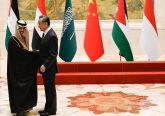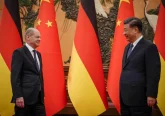
After fresh re-election, Barack Obama skipped Europe. And no one is surprised. Instead, he made his first foreign trip to Burma (Myanmar), Cambodia and Thailand, thus clearly indicating the priorities of US foreign policy in the next four years.
Historic visit
Of special significance is above all Obama’s trip to Burma – a country under military rule since the 1960’s, which until recently invariably occupied the very far end of any civil liberties ranking. Burma’s position began to change rapidly in 2010 when Thein Sein, the new president, for reasons not entirely clear, initiated democratic reforms and freed thousands of political prisoners, including the most famous regime victim, Aung San Suu Kyi. She, a former denizen of Oxford, was put under house arrest in 1989 and kept in custody virtually ever since. Following her release, Suu Kyi was not only allowed to go on a triumphant international tour – in Oslo she finally collected the Nobel Peace Prize awarded in 1991 – but also to run in parliamentary by-elections. In April 2012 her National Democratic League won 43 of 45 seats under contention, thus becoming the largest opposition party. Only a few months after the reforms started, first non-governmental organizations and independent media began to operate in a country not so long ago deemed as an “outpost of tyranny”.
Although democratic transformation has proceeded quickly, millions of its citizens remain in extreme poverty, hundreds of political prisoners are still in jail and the northern part of the country still devastated by civil war. Meanwhile, the military coup is an ever-present possibility and the president’s commitment to democracy is still difficult to assess. For these and many other reasons, the democratic changes may collapse.
Despite all these uncertainties, Barack Obama decided to visit — the first US president in office to do so. What does this mean? I suggest this is clear evidence of a fundamental change in American foreign policy. After Burma, Obama flew to Thailand and then Cambodia, taking part in the Association of Southeast Asian Nations summit. It was perhaps a strange choice. All of this occurred while Israel was engaged in the biggest military operation in Gaza in four years, when Syria has been engulfed in a civil war for almost two years and when Afghanistan still claims American lives on a daily basis.
Heading East
Reorientation in American foreign policy – the “Asian pivot”, as White House officials refer to it – aims to strengthen the U.S. presence in Southeast Asia at the expense of its current involvement in the Middle East and Afghanistan. The president’s visit is also a clear signal to China. Its increasingly expansive foreign policy and Beijing’s massive economic influence in the region has aggravated its relations with neighbouring countries, leading to serious territorial disputes with Japan, the Philippines and Vietnam. The US has recently held naval exercises with Japan and South Korea in waters south of the Korean peninsula. In his Burma speech, president Obama left no doubts as to where Washington will concentrate its diplomatic efforts in the nearest future:
The United States of America is a Pacific nation. We see our future as bound to those nations and peoples to our West. As our economy recovers, this is where we believe we will find tremendous growth. As we end the wars that have dominated our foreign policy for a decade, this region will be a focus of our efforts to build a prosperous peace.
Does anyone need Europe?
And what role will the Old Continent play in this new order? Probably a marginal one, unless the EU changes course quickly. Euro-optimists may keep on hailing the Union as the largest and one of the most competitive economies in the world, but even they admit its actual importance on the global stage is disproportionately small. Obama’s visit to Asia and the latest Israeli-Palestinian conflict have once again confirmed what everybody knows but does not dare to say aloud. Alarmed by the events in the Gaza Strip, President Obama and Secretary Clinton called the leaders of several countries with the greatest influence in the region: Egypt, Turkey, France and Qatar. Forget Catherine Ashton.
European countries are rapidly losing their status as valuable partners to the United States, though some governments, especially London, do all they can to ignore this fact. On the day of Obama’s re-election, David Cameron congratulated the winner and expressed his hope for a close cooperation, primarily in two areas: pulling the global economy out of the crisis and helping to end the conflict in Syria. No profound geopolitical insight is needed to know that the United Kingdom on its own is of little assistance to the American president on these matters. Nevertheless, the bulk of the British political class still seems to believe that the UK’s foreign policy should be based on an Anglo-American “special relationship”, with London acting as a mediator in the dealings between America and Europe. The problem is that today, Washington not only doesn’t need a middleman in its relations with the Continent – it hardly needs Continent full stop.
A true Euro-American partnership is possible only if the European Union acts as a whole. Many European politicians – including, I’m glad to admit, Poland’s foreign minister – is aware of this fact. Britain still has difficulty coming to terms with the new reality. London’s cognitive difficulties, however, seem to render Brussels increasingly impatient, and the further marginalization of Europe on the international scene will hopefully embolden it to take a firmer stance towards Britain and demand a clear statement as to its future in Europe. Should this not happen, it will be yet another reason to take presidential trips elsewhere.
Łukasz Pawłowski is a contributing editor for ‘Kultura Liberalna’ (www.kulturaliberalna.pl), PhD candidate at the Institute of Sociology, University of Warsaw, currently an academic visitor at the Department of Politics and International Relations, University of Oxford.







1 Comment